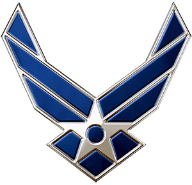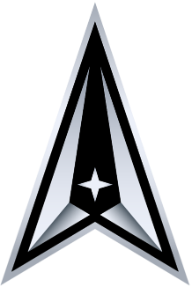Program and Courses
The Air Force ROTC Program provides college-level education to qualify eligible cadets for commissioned service in the United States Air Force or United States Space Force. The four-year program is offered in two distinct two-year courses: the General Military Course (GMC) and the Professional Officer Course (POC). Transfer students from the Army or Navy ROTC programs are credited equivalency in the GMC.
The GMC concentrates on basic Air Force organization, core values, air power history, and establishing a leadership foundation. Eligible GMC cadets may compete for a commission and are evaluated based on academics, physical fitness, and motivation for enrollment into the POC. The POC is designed to build leadership and professional qualities by concentrating on the principles of leadership, management, and national security policies. AFROTC also sponsors over forty professional development extracurricular activities a year, designed to increase leadership, management training, and orient cadets to the Air and Space Forces. Such activities include: base visits, general aviation training, potential orientation flights, field training exercises, summer internships, special warfare orientation courses and high visibility conferences.
Academic Courses
Required courses for AFROTC at VMI are available in the Academic Catalog and fall under the title of Aerospace Studies.
AS100 - Initial Military Training (IMT)
AS100 courses focus on Air Force core values and heritage. The goal is to encourage students to pursue a U.S Air Force or U.S. Space Force career or at least seek additional information to be better informed about the role of the Air and Space Forces.
AS200 - Field Training Preparation (FTP)
AS200 courses focus on providing a fundamental understanding of both leadership and team building. Students will apply leadership perspectives when completing team building activities and discussing things like conflict management.
AS300 - Intermediate Cadet Leaders (ICL)
The AS300 course goal is for cadets to have a more in-depth understanding of how to effectively lead people, and provide them with the tools to use throughout their detachment leadership roles. Secondly, cadets will hone their writing and briefing skills. The second semester of AS300 is centered on leadership and ethics. The goal is to get cadets thinking about leadership through their own lens, and give them some tools to work on their leadership skills. The AS300 class (juniors) may also be referred to as Professional Officer Course (POC) cadets.
AS400 - Senior Cadet Leaders (SCL)
AS400 courses are designed to prepare cadets for life as a Second Lieutenant. The AS400 course covers the basic elements of national security policy and process, basic Air Force domain operations as well as selected roles of the military in society and current domestic and international issues affecting the military profession. The course also covers the responsibility, authority, and functions of an Air Force commander and selected provisions of the military justice system. The AS400 class (seniors) may also be referred to as Professional Officer Course (POC) cadets.
What role does my academic major play?
Some career fields require specific majors. For example, if you want to be a Developmental Engineer, you need to have an engineering degree. Additionally, there are some scholarship opportunities that are tied to specific majors such as electrical engineering, foreign language, and other STEM majors.
However, you are encouraged to major in a field that you are passionate about and can succeed in. How well you perform in academics (i.e. GPA) carries significant weight in how you rank among your peers in AFROTC which factors into your competitiveness for a scholarship, opportunities to attend summer AFROTC programs, choice of career field, etc.
What is the biggest hurdle for freshman AFROTC cadets academically?
Good study habits. As a college student, you will be very busy and very tired. Learn how to manage your time so that you do not fall behind in your classes, practice good study habits, and do not wait until the end of the semester to ask for help from your professors or your school’s learning resources.
Training
In addition to academic requirements, the Air Force ROTC program include physical training (PT) as well as officer development training (ODT). PT sessions are one hour, twice a week. The goal is to instill a culture of fitness and a healthy lifestyle among our Airmen so that they are prepared to deploy and fight. These training sessions are led by AS300 and AS400 cadets.
AFROTC has opportunities to attend ODT events over the summer and during the school year. ODTs for freshmen and sophomores allow cadets to learn more about the Air Force and be exposed to various career fields and operations. During the school year training may include incentive flights and base visits. ODTs for juniors and seniors allow cadets to broaden their leadership skills. They may include, but are not limited to planning and executing large-scale events, attending specialized training events, and summer internships.
Between sophomore (3rd Class) and junior (2nd Class) years, AFROTC cadets attend field training (FT) for two weeks at Maxwell Air Force Base (AFB) in Alabama. Successful completion of this training is required to officially enter the Professional Officers Course (POC) and to earn a commission in the U.S. Air Force or U.S. Space Force.
Commissioning
After successfully completing all Air Force ROTC and academic degree requirements, cadets accept a commission as Second Lieutenants in the Air Force or Space Force. The length of initial service commitment varies by career. Most officers have a four-year, active-duty service commitment. Pilots have a 10-year, active-duty service commitment, and both Combat System Officers and Air Battle Managers have a six-year service commitment upon completion of their respective training.
The Ceremony
Commissioning and pin-on ceremonies are milestone events seen at any college or university, and VMI is no exception. At the Institute, this moving and inspiring event may take place at the conclusion of the fall semester or at the most common time, during May graduation events.
During the commissioning ceremony, cadets hear from distinguished military leaders from the U.S. Air Force, U.S. Space Force, or other speaker, and take the Oath of the Commissioned Officer. Cadets then gather and with family and friends where they select individuals, many times ROTC faculty, to pin their Second Lieutenant's rank onto their uniforms.
.svg)
.png)

